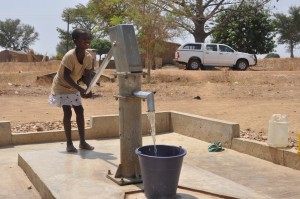ECOWAS ministers call for more budgetary allocation to water sector
 ECOWAS Ministers in charge of the Water sector have called for the allocation of substantial budgetary allocation to the sector, considering the overriding importance of water to the sustenance of life.
ECOWAS Ministers in charge of the Water sector have called for the allocation of substantial budgetary allocation to the sector, considering the overriding importance of water to the sustenance of life.
At the end of the 4th Session of the Ministerial Follow-up Committee of the Permanent Framework for Integrated Water Resources Management (IWRM) Coordination and Monitoring in West Africa, held in Dakar, Senegal on November 27, 2015, they also approved the draft directive on the development of water infrastructure in West Africa.
A statement issued by the Commission and made available to the Ghana News Agency said the ministers adopted 17 Resolutions including the consideration of the report of the 10th session of the IWRM Technical Experts’ Committee (TEC).
It said the ministers also adopted a resolution on the Implementation Action Plan of West Africa’s Water Resources Policy as well as on capacity building of the Water Resources Coordination Centre (WRCC).
In this regard, they called for the implementation of an institutional study for a structural reform of the WRCC including the need to strengthen it in partnership with research structures and degree training centres.
The ministers also called for the implementation of an ex-post economic evaluation of a large water structure (dam) in each country for capitalisation and sharing of results at the regional level under the aegis of WRCC, in order to inform decision makers while selecting development projects.
The other resolutions adopted included a technical and financial support for the development of national integrated water resources management plans in the Gambia, Guinea, Guinea Bissau, Sierra Leone, Liberia and Nigeria.
Also desired is the promotion of new trans-boundary basin organisations in West Africa.
The ministers also pushed for the scaling up of dissemination and ownership by Member States of the guidelines developed at country level by ECOWAS and the International Union for Conservation of Nature (IUCN), in order to ensure their integration as decision support tools in national large water infrastructure construction and operation programmes.
The ministers want the continuation, by ECOWAS and IUCN, of the process of promoting the Integrated Ecosystems Management approach in West Africa.
They want the adoption, by the ECOWAS political bodies, of a Regional Consultation Mechanism on Integrated Ecosystems Management (RCM-IEM).
Further, they called for the effective management of the Regional Programme for Integrated Development of the Fouta Djallon Massif by ECOWAS.
Specifically, through Resolution 16, they recommended advocacy in order to have a better consideration of the Water dimension in the negotiations at climate change conference COP21.
Additionally, the ministers said advocacy in conjunction with the ECOWAS Parliament has become necessary in order to expedite the process of ratification and implementation, (by all ECOWAS Member States), of the New York Convention of 1997 on the law relating to the uses of international water courses for purposes other than navigation.
The opening ceremony of the Session was presided over by Mr Diène FAYE, the Senegalese Secretary of State for Hydraulics, who represented the Minister of Hydraulics and Sanitation, who is the current Chairman of the IWRM Ministerial Monitoring Committee in West Africa.
He was supported by Mr Ousseini SALIFOU, who stood in for the ECOWAS Commissioner for Agriculture, Environment and Water Resources.
Also on hand, were the IUCN Regional Director for West and Central Africa and Mr Jamie SKINNER, Director of GWI/West Africa, Director of WRCC and other technical and financial partners.
There were representatives of the IWRM Sub-regional Consultation Council (CRCRE), UEMOA, Global Water Intelligence (GWI), Edwards Aquifer Authority (EAA), Food and Agricultural Organisation (FAO), Global Water Partnership (GWP) West Africa, NEPAD’s Water Network of Centres of Excellence, and SITWA/RAOB.
Source: GNA
